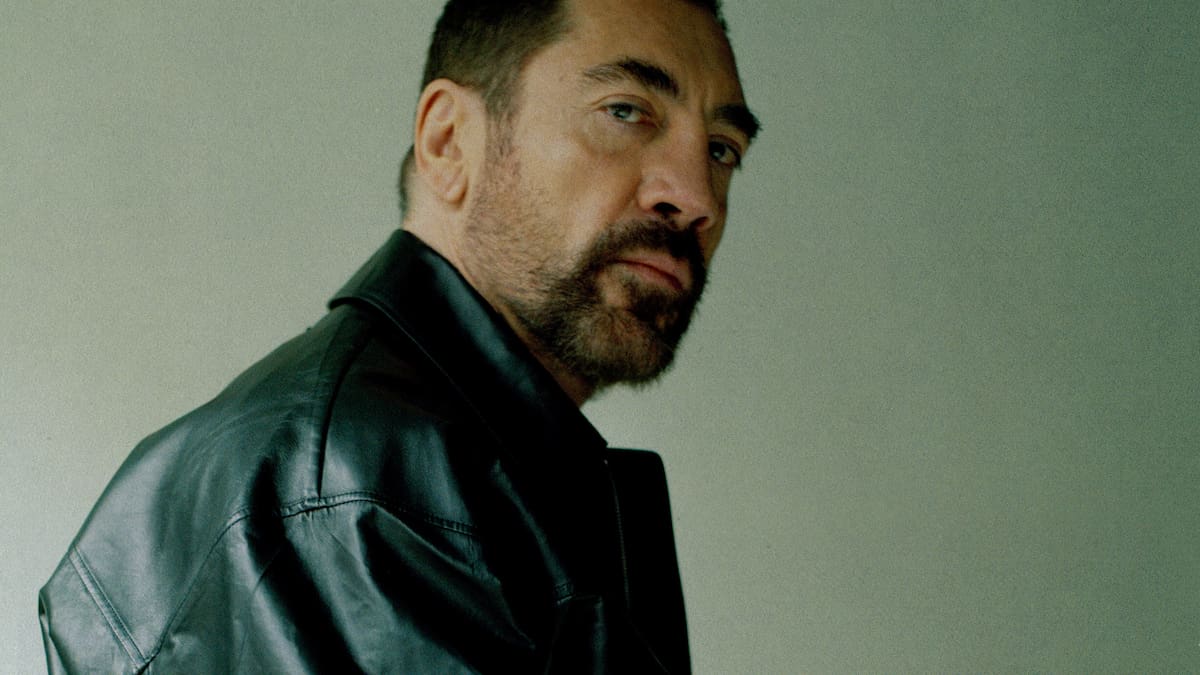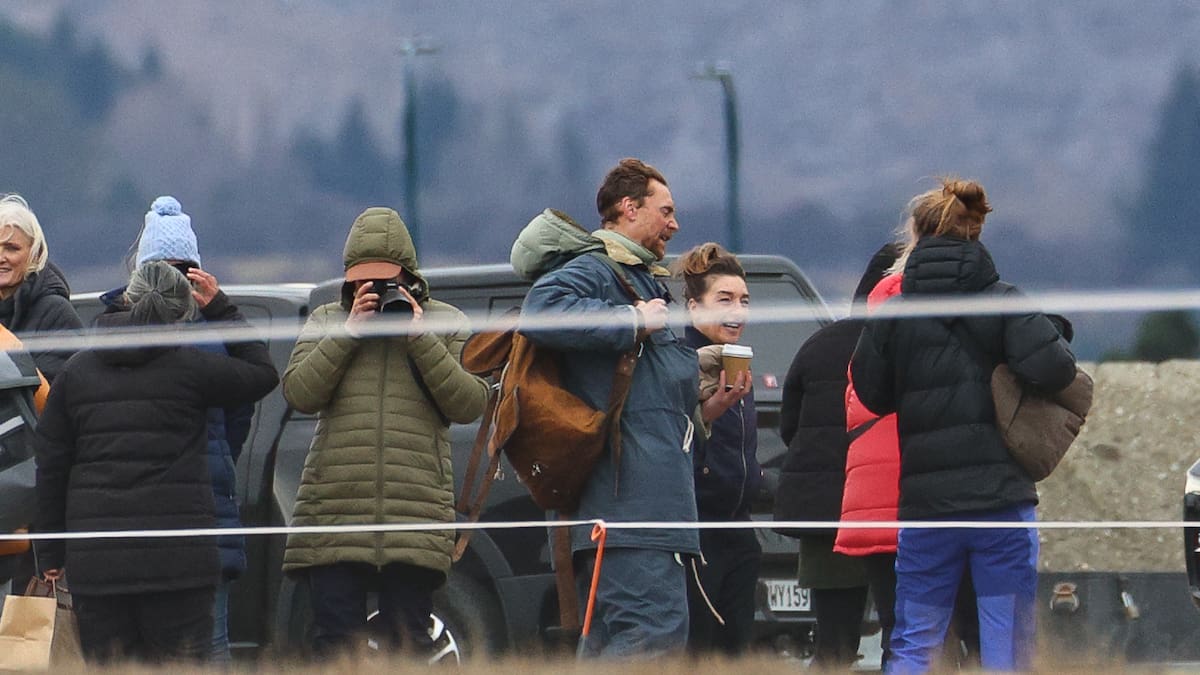The Oscar-winning actor may be starring alongside Brad Pitt in the blockbuster F1: The Movie, but his career has been harder to categorise.
It’s hot and sunny, and there’s a pool party on the seventh floor of the blandest apartment complex here.
In the elevator, flaxen-haired women holding floaties and red Solo cups file in, chattering with such single-minded purpose that no one realises one of cinema’s most crackling actors has been backed into a corner. It’s not
a position in which the men that Javier Bardem is best known for playing tend to find themselves. But on this weekend morning, dressed in athletic shorts, a pink performance tee and laceless sneakers, Bardem flashes a broad smile and is gamely smooshed.
When his voice – melodic, rounded as a single malt, vowels elongated to their breaking point – finally fills the elevator car, musing on traffic conditions, it sounds like a sonnet. The flaxen heads register the man in their midst, snap to attention and swivel.
Bardem does not drive – ironic, given that he was here to discuss his role in F1 The Movie, a blockbuster about Formula One ambitious enough that it embedded its film shoot into an actual professional racing season and whisked Bardem and his castmates, Brad Pitt, Damson Idris and Kerry Condon, from the Silverstone Circuit in Britain to Budapest to Las Vegas to Abu Dhabi.
In the film, Pitt and Idris play drivers on a wheezing racing team that has hobbled through two seasons without a single point. Bardem rallies them as a driver turned owner named Ruben Cervantes, who is in deep debt and has placed his last big, perhaps misguided, bet on an old friend and a promising, but green, rookie.
The driving is the point of the movie, of course, with Top Gun: Maverick director Joseph Kosinski engineering IMAX-certified cameras to fit in the seat of a racing car. But Pitt, also a producer on the film, called Bardem the “anchor of our story” and only very gently teased him for his refusal to get behind the wheel. Still, Bardem doesn’t appear to have had too much trouble getting around.
Bardem, 56, seemed born with a knack for navigating tight corners. The offspring of a long line of working actors and artists, he grew up in Spain in theatres and on sets where his mother, Pilar, acted. She raised him and his two older siblings “like a pack of wolves,” he said. He loved her and is close to his brother and sister, but it was an arrangement that Bardem said “could be brutal”.
Even after his career took off, he did not dream of domestic bliss. He just wanted to survive. “It happened naturally,” Bardem said. “I never felt rushed. I never felt like I had to do it. And thank God it did happen. It’s crazy how I don’t recall my life before the kids.”
Bardem is married to superstar actor Penélope Cruz, and the couple’s son, Leo, and daughter, Luna, are in middle school. Bardem can still remember deciding he wanted children. It was “as an act of love,” he said, and a desire to “create something beautiful”.
It did turn out to be beautiful, but it was also world-bending and hard. The process – with a learning curve more dramatic than any racetrack turn – forced him to look inward, and he studied his wife, inscrutable in her transformation.
“As a man, you have accompanied that person,” he said, but you have not been through what she has. “The pregnancy was not that bad,” he recalled. “It was the depression after. She was not capable of manifesting it, and it was so new for her. Now it’s better, but 14 years ago, it was: ‘Is it OK to share this with my husband? Is it OK to feel this way when I’m supposed to feel the opposite?’ I was not able to get the dimension of what it was, unfortunately. But later on, I did. She’s an amazing, brave, strong, beautiful woman that she was able to share it.”

In his penthouse apartment in Atlanta, Bardem showed off handwritten love letters from Cruz and doodles by his children that he brings along to decorate the greige living quarters he occupies while working. Comedian Conan O’Brien, who first encountered Bardem on his late-night talk show and has remained friends with him since (inviting him on both his podcast in 2023 and recent travel show this spring), lavished praise on Bardem and compared his indelible good looks and expressive “Greek comedy-tragedy mask” of a face to Marlon Brando’s. Bardem, assessing his own reflection, compared himself to a gorilla.
Bardem is in town to shoot an Apple TV+ adaptation of Cape Fear (he’s the lethal ex-convict), a take on Martin Scorsese’s iconic film of the same name and the novel The Executioners. But he has been ricocheting between Los Angeles, for work, and Madrid, where he and Cruz live, on breaks in his schedule. Two consecutive weeks is the longest he will go without seeing his children, a rule he cemented while working on the movie Being the Ricardos, in which he played Desi Arnaz. He hit three weeks, “and literally my body was having physical reactions of pain and sadness,” he said.
This happens to him, he said. Bardem is a deep feeler, bringing a well of emotion to even the blockbuster roles he has taken between independent projects. In the Dune franchise, his Stilgar operates with the zeal of a true convert. In the Bond instalment Skyfall, in which he starred opposite Daniel Craig, Bardem imbued the menacing Raoul Silva with a combustible charm, at once unhinged and seductive.
Bardem nabbed his first acting job when he was 6, cast in a bit part on a Spanish television series that starred his mother. But he did not break out in the United States until the Coen Brothers’ 2007 film, No Country for Old Men, which made him a movie star and earned him an Oscar for best supporting actor. Bardem played Anton Chigurh, a rampaging villain with a haircut so awkward and malevolent it remains a touchstone Halloween costume to this day. But his reception in the towns where the film was shot did not build confidence.
“It was challenging for me,” Bardem said. “I would walk around some cities in Texas, and I would feel some looks on me and some behaviours toward me that were not the nicest. It was like, ‘OK, I get it.’” He was a veteran of art house cinema in Spain and had spent time in New York and Los Angeles without ever feeling so self-conscious.

At the time, Bardem was 37 and had been “in the middle of a depression”. He had just ended a long relationship. “I felt disconnected from the pleasure of life,” he said. “I never went to a place where I was thinking dark things, but I was sad. It took me a while to get out of it.”
The work helped him muddle through, as did his co-star Josh Brolin, who “opened the windows, literally, because I was living in this dark house, and he would pull open the curtains and take me for a walk. I started to feel like: ‘Oh, there is joy. I’m blessed to be alive.’ When I finished that movie, I was a different person.”
When the moment comes
Bardem reconnected with Cruz on the set of the Woody Allen film Vicky Cristina Barcelona the next year, which was 15 years after they had both starred in Jamón Jamón, an outrageous and sexy tragicomedy in which whole legs of ham feature prominently and Bardem at one point pantomimes a bullfight while completely naked. She had been 17, and Bardem 21.
“We had our moment there,” he said. “Later on, we had another moment. But she was with someone or I was with someone. We were very young, and it was not the moment, but then the moment came, and we knew, and we tried to avoid it.”
As the shoot on Vicky Cristina Barcelona was winding down, Bardem had yet to make a move. He called three of his closest friends, fretting. “Because it is complicated,” Bardem said. “She’s an actress. I’m an actor. She travels. I travel. How do you do that?” Bardem knew the relationship would attract attention, which he dreaded. But the last evening on set, “we had a couple of drinks, and then that’s 18 years ago”.
It is only when the conversation turns to the invasiveness of paparazzi that Bardem lets slip a glimmer of the rage he can radiate onscreen. He is relieved that in Madrid the two are seldom bothered. Bardem is glad to have rocketed into the American consciousness before iPhones and social media, which he loathes.

He spends as little time as he can on devices, an accomplishment to which actor Chloë Sevigny, who played Kitty Menendez opposite Bardem as the noxious patriarch Jose in last year’s Monsters: The Lyle and Erik Menendez Story, can attest.
“I never saw him look at a telephone once,” she said. “He would just sit on set, staring or talking to people. I was like: ‘Who is this person? Where did he come from, and how is he existing?’”
Bardem knows fame has its perks. “It can get you a table when the restaurants are booked, and you can meet people that you admire,” he said. Pitt recalled with evident pleasure how on a break in production, Bardem called him out of the blue. “He said: ‘Hey, I’m going to fly over to Dublin to see the Boss. You want to come with?’” Pitt said. Twelve hours later, they were on their way to see Bruce Springsteen in concert.
But becoming so visible steals from you, too, Bardem said. “That’s why some performers or directors that have become very famous, all of a sudden they’re working in their own bubble, and you see that there is no connection anymore,” he said. “They retreat into themselves, but then they’re not capable of knowing what is going on out there beyond what they hear is going on, and you can see it in their performances. You have to always be aware; belong, belong, belong.”
Losing that sense of interconnected humanity doesn’t just threaten your art, Bardem said. He has seen how it compromises people’s ability “to criticise what needs to be criticised”. Bardem has been on the record in support of Palestinian rights for over a decade, but the recent suffering in the Gaza Strip has caused him particular anguish.
“How can we make a change?” he said. “Vote, for sure. Denounce, for sure. Be loud and point it out, knowing that there will be repercussions.” He is not intimidated.

His mother taught him that, validating his convictions and showing him how he could express them. “She could be as sensitive and light as a butterfly, and she could be as ferocious as a lion,” he said. “She had the whole range.”
Bardem’s father was less present; his parents separated after he was born. When Bardem was 19, he was cast in The Ages of Lulu. “I played this prostitute that had sex with men and women,” he said. “It was a tough movie, but a great movie.” Bardem’s father saw it and stopped speaking to him, aghast at the frank depiction of gay sex. “He felt ashamed of me as a son,” Bardem recalled.
Then Bardem shot Jamón Jamón. “It was fights, women,” Bardem said. “And he came back to me, and he was super proud of me being an actor.” He died when Bardem was 26, but Bardem is still exploring the masculinity he modelled – and its limits – in his work.
“I’ve been shown the toxic male world,” he said. “I’ve been part of it in the sense that I was raised in the ’70s and ’80s in Spain. But then that behaviour wouldn’t be tolerated at home, and that was a real education.”
‘A love story between these two men’
In F1 The Movie, a different actor might have played Ruben as an ageing relic, desperate to prove his prowess in a young man’s game. But Bardem swerves. In his scenes with Pitt, he dials up the emotion and infuses their onscreen relationship with a buoyant sweetness. Bardem summarised the movie as “a love story between these two men”.
“I think we make a great couple,” Pitt said. “The electricity is there.”

Soon, Bardem and Cruz will hunker down in Spain to shoot Bunker, a thriller that director Florian Zeller, who also helmed 2020’s The Father, starring Anthony Hopkins, wrote with the couple in mind.
“What is good about working with Penélope is, first of all, she’s a great actress,” he said. “But second, we know each other, and we know where to stop. We are not there to hurt each other.”
Bardem is invested in his characters, but he does not mistake himself for them. When he was a child, he spent a lot of time in his mother’s dressing room. Once, he saw her vomiting. She had been cast as Queen Isabella, and she was hunched over the toilet, retching in her costume. It scared him. “I said, ‘Are you OK?’ and she said, ‘Don’t worry,’” he recalled. He watched her rinse out her mouth, walk out onstage and “boom, she was the queen”.
Her metamorphosis awed him. Her, but not her. His mother, and the queen. “You have to have that,” he said. “You have to be scared. There is so much uncertainty, and you have to live with that.”
This article originally appeared in The New York Times.
Written by: Mattie Kahn
Photographs by: Ryan James Caruthers
©2025 THE NEW YORK TIMES






